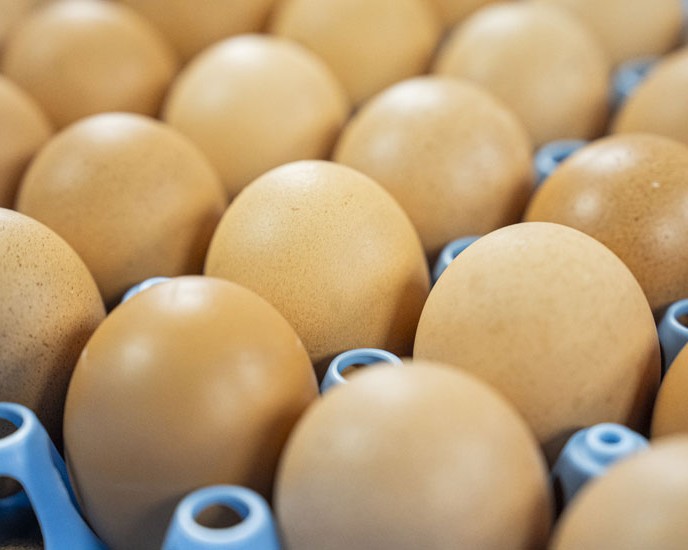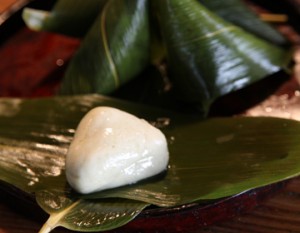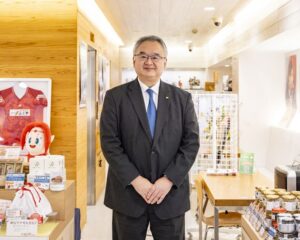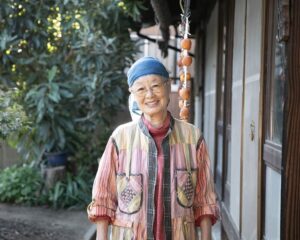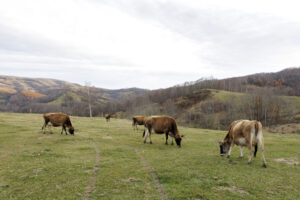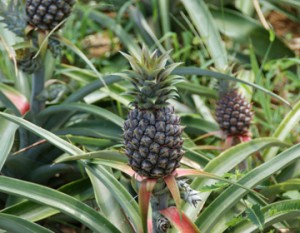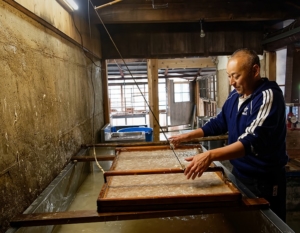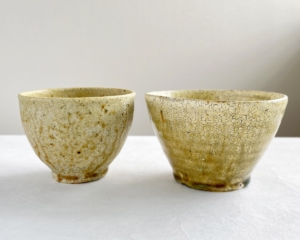Ito City, Fukuoka Prefecture, is a popular tourist destination that offers the best of both the sea and the mountains. At the foot of Mount Raizan, blessed with beautiful water and air, Itagaki Farm raises chickens and produces the brand-name eggs “Tetsuya and Noriko’s Eggs,” which are sold at department stores and high-end supermarkets.
We want to produce the best eggs in Japan! Developing a brand-name egg

About 30-40 minutes by car or train from the center of Fukuoka City. Itoshima City in Fukuoka Prefecture attracts many visitors daily seeking its abundant nature and delicious local products. Fresh vegetables and fruits, seafood such as sea bream—Japan’s top catch—and oysters from thriving aquaculture, as well as locally raised cattle, pigs, and chickens are famous. “Itoshima-produced” local products are beloved by many chefs at popular restaurants throughout Fukuoka City. “Itagaki Farm” is located at the foot of Mount Raizan, a bit inland from the city center of Itoshima City. It is a place blessed with beautiful water and air.
It was here over 60 years ago that the grandmother of chicken farmer Tetsuya Itagaki began raising chickens. His father, Tetsuya, expanded the business and laid the foundation for the current operation. “My father wanted to increase the number of chickens and produce high-quality eggs to grow the company, but no matter how much effort we put into making delicious eggs, they were bought by wholesalers at low prices. That’s when he decided to create the best eggs in Japan, even if they were a bit more expensive, so that people would say, ‘These eggs are great!’ He developed a unique feed by adding oak and beech tree sap (wood vinegar), binchotan charcoal, seaweed, and lactic acid bacteria to the regular feed, and the result is ‘Tetsuya and Noriko’s Eggs.’ By the way, ‘Tetsuya and Noriko’ are the names of his parents. The name reflects Tetsuya’s desire for customers to know the producers behind the eggs. To deliver these brand-name eggs directly to customers, Tetsu joined the family business as a sales representative.
He went door-to-door and traveled all over the country. Gradually, word of mouth spread, and the eggs gained popularity.

“I want to share the eggs my father perfected!” With this goal in mind, Mr. Itagaki visited every produce store, patisserie, and restaurant he could find, spending his days cold-calling potential customers. The freshness and rich flavor of the eggs, delivered directly from the farm, caught the attention of professionals, and gradually, his client list grew. ”I spent about five years focused solely on sales. Fortunately, some chefs who had used the eggs at their training establishments expressed a desire to continue using them even after I started my own business, and others introduced me to new clients. Through these connections, I gradually reached a point where I no longer had to actively pursue new business, and I myself became involved in chicken farming.” As a result of his efforts to create high-quality products and communicate their value, the eggs from ‘Itagaki Farm’ gained popularity. Now, many people even travel from far away to buy eggs directly from the farm.
We have reduced the number of chickens and are working to create a farm that is kind to both people and chickens.

It has been 10 years since Mr. Itagaki began working in poultry farming. One issue he has been gradually addressing is the decline in the number of chickens. During his father, Mr. Shinya Itagaki’s time, there were approximately 60,000 chickens, but now there are about 45,000. While external factors such as rising feed costs have contributed to this decline, Mr. Itagaki’s philosophy of not prioritizing mass production for the sake of sales also plays a role. “The business model of mass-producing chickens and having the surplus taken by suppliers ultimately leads to continuous losses. More importantly, neglecting the chickens’ care results in a decline in egg quality, which is the worst outcome. As a chicken farmer, my top priority is to raise chickens in the best possible environment.” Mr. Itagaki is most concerned that expanding his customer base will increase tasks such as orders, deliveries, and management, leaving less time for chicken care.
What Mr. Itagaki values most is creating the right environment for his chickens. He removes chicken manure regularly, processes it into compost at a treatment facility, and delivers it to farmers. He does not leave feed in boxes but instead feeds each chicken three times a day, adjusting the amount based on their individual health. He also ensures proper ventilation by adjusting it according to the weather to prevent odors from building up in the chicken coop, all out of love for his chickens. “It is said that the color and taste of eggs are determined by the feed the chickens eat, but I believe the environment is equally important. If the chickens are in a stress-free environment, their egg-laying rate increases, and they produce eggs with a rich flavor, strong shells, and a smooth, clean surface over a long period. On the other hand, a poor environment makes chickens more prone to illness, resulting in eggs with a bland taste, thin shells, and a rough surface.” The health of chickens is said to be indicated by their combs, and when they are unhealthy, the combs become small and droop sideways. However, the combs of the chickens at ‘Itagaki Farm’ are large and stand tall and straight. This is a testament to Mr. Itagaki’s dedication and care in raising the chickens with love and attention to detail.

Additionally, “Itagaki Farm” is committed to harvesting by hand. While some chicken farms use rollers for harvesting and mechanical packing, Mr. Itagaki believes, “Eggs are living things just like chickens. We don’t want to cause them unnecessary stress by moving them around unnecessarily.” Naturally, since this is work involving living creatures, there are no days off at the chicken farm, and caring for the chickens and shipping them out are done every day. Approximately 40,000 eggs are collected daily, and currently, all of them are shipped out without any surplus, earning the farm consistent trust from its clients.

The eggs laid by chickens fed a feed developed through trial and error are rich in minerals and vitamins. When you crack open the firm shell, you’ll find a plump, white egg white topped with a deep-colored, tall yolk, immediately conveying the egg’s freshness. “We purchase chickens that can lay eggs at around four months old and raise them, but we start encouraging them to lay eggs around six months old. Eggs laid during this period are of the highest quality. In other words, only the eggs laid during the best period of a chicken’s life become ‘Tetsuya and Noriko’s Eggs.’” When you taste them, you can feel a subtle saltiness and a rich, deep flavor, clearly different from ordinary eggs. ”I recommend eating them over rice. Personally, I like to drizzle them with sweet soy sauce from Kyushu. Even plain eggs taste delicious with dashi soy sauce.” To truly savor the natural flavor of eggs, try them with soy sauce that doesn’t contain umami-enhancing ingredients.
Chickens reward you for the effort you put into them.

Having been involved in chicken farming for 15 years, Mr. Itagaki has never taken a full day off work. “Eggs can be produced steadily without the fluctuations of crops like vegetables, but since they are living creatures, they require daily care.” That said, after reducing the number of chickens over a 10-year period, he has finally been able to take a half-day off once a week recently. When he has free time, he goes out on his motorcycle or bicycle to relax in nature. “This is a mentally and physically demanding job, so I think 60 is probably the limit for me. But until then, I want to continue working closely with the chickens and producing high-quality eggs. I want to take responsibility for what I do, and if I take proper care of them, the chickens will repay me. If I ever feel that my actions are causing them trouble, I will retire gracefully and hope that a younger generation will step up to take over. And I hope to have time to travel by motorcycle or bicycle as a hobby.”
With the memory of the “delicious!” he felt when he first tasted the eggs his father developed, Mr. Itagaki spends his days caring for the chickens and producing delicious eggs. Eating an egg that contains the producer’s thoughts makes it taste even more delicious and evokes a sense of gratitude.



